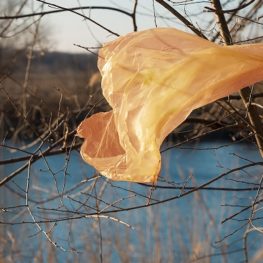On May 4th, 2022 New Jersey took the major step in protecting our environment and ourselves from the harmful effects of plastic pollution by replacing many single-use plastics with reusable alternatives.
In November of 2021, NJ Governor Phil Murphy signed into law the nation’s strongest ban on single-use plastics.  Watershed watchdog Raritan Headwaters Association enthusiastically supports the new law, which benefits the health of both humans and wildlife by keeping plastics out of rivers, streams, lakes, reservoirs and the ocean.
Watershed watchdog Raritan Headwaters Association enthusiastically supports the new law, which benefits the health of both humans and wildlife by keeping plastics out of rivers, streams, lakes, reservoirs and the ocean.
How do I comply with NJ’s single-use plastic ban?
Here are some tips to help you comply with New Jersey’s ban on single-use carryout bags, polystyrene (styrofoam) food service products, and plastic straws:
- BYO reusable bags when you go shopping. Most stores will be prohibited from providing single use plastic or paper bags.
- BYO food containers for leftovers when dining out. Styrofoam food containers are included in the ban.
- BYO reusable straw. Consider metal straws that can be used over and over again.
What more can I do?
NJ’s ban is an important first step in addressing the negative impacts of plastics but there is so much more we each can do to reduce plastic in the environment. Practice the “4 Rs” – Refuse, Reduce, Reuse and Recycle Plastics. Simple things such as carrying a refillable water bottle, looking for products without plastic packaging, replacing plastic cups, plates and cutlery with reusable items, and choosing clothing made from natural fibers are some of the many ways we can help. Another way to help is by joining RHA’s Annual Stream Cleanup!
Why is plastic a concern?
Worldwide, we are now producing nearly 300 million tons of plastic every year, half of which is for single use; only about 10% is ever recycled. Estimates for the amount of plastic reaching our oceans each year are in the range of more than 8 million tons. Plastics never go away; they persist in the environment even after they break down into tiny particles called microplastics (read about RHA’s study of microplastics in the Upper Raritan). Research has shown that plastics are having detrimental impacts on marine and freshwater ecosystems as well as human health.



